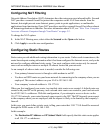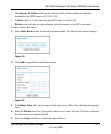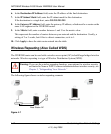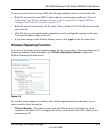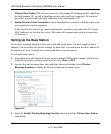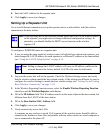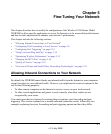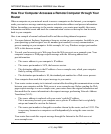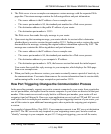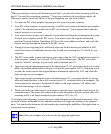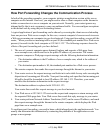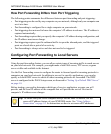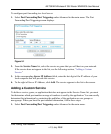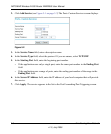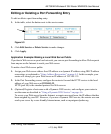
NETGEAR Wireless-N 300 Router WNR2000 User Manual
5-2 Fine-Tuning Your Network
v1.3, July 2009
How Your Computer Accesses a Remote Computer through Your
Router
When a computer on your network needs to access a computer on the Internet, your computer
sends your router a message containing source and destination address and process information.
Before forwarding your message to the remote computer, your router must modify the source
information and must create and track the communication session so that replies can be routed
back to your computer.
Here is an example of normal outbound traffic and the resulting inbound responses:
1. You open Internet Explorer, beginning a browser session on your computer. Invisible to you,
your operating system assigns a service number (port number) to every communication
process running on your computer. In this example, let’s say Windows assigns port number
5678 to this browser session.
2. You ask your browser to get a Web page from the Web server at www.example.com. Your
computer composes a Web page request message with the following address and
port information:
• The source address is your computer’s IP address.
• The source port number is 5678, the browser session.
• The destination address is the IP address of www.example.com, which your computer
finds by asking a DNS server.
• The destination port number is 80, the standard port number for a Web server process.
Your computer then sends this request message to your router.
3. Your router creates an entry in its internal session table describing this communication session
between your computer and the Web server at www.example.com. Before sending the Web
page request message to www.example.com, your router stores the original information and
then modifies the source information in the request message, performing Network Address
Translation (NAT):
• The source address is replaced with your router’s public IP address.
This is necessary because your computer uses a private IP address that is not globally
unique and cannot be used on the Internet.
• The source port number is changed to a number chosen by the router, such as 33333. This
is necessary because two computers could independently be using the same session
number.
Your router then sends this request message through the Internet to the Web server at
www.example.com.



